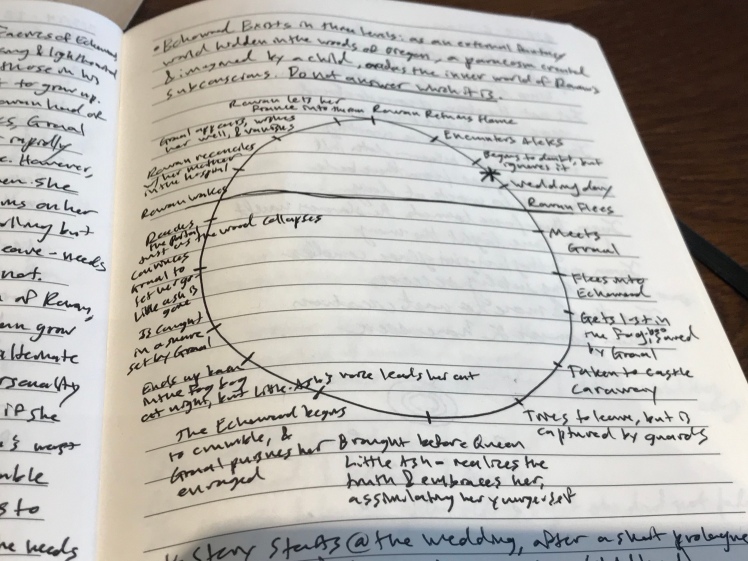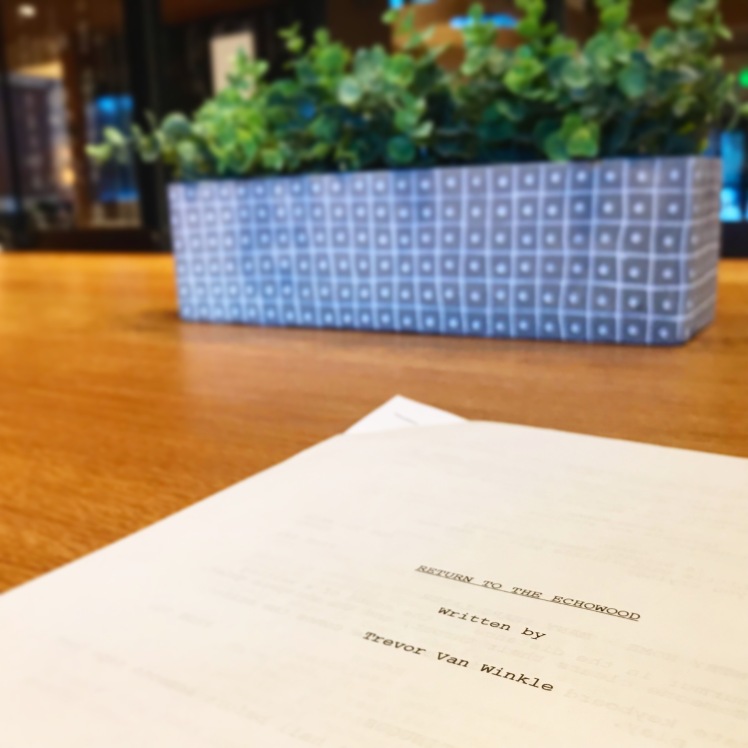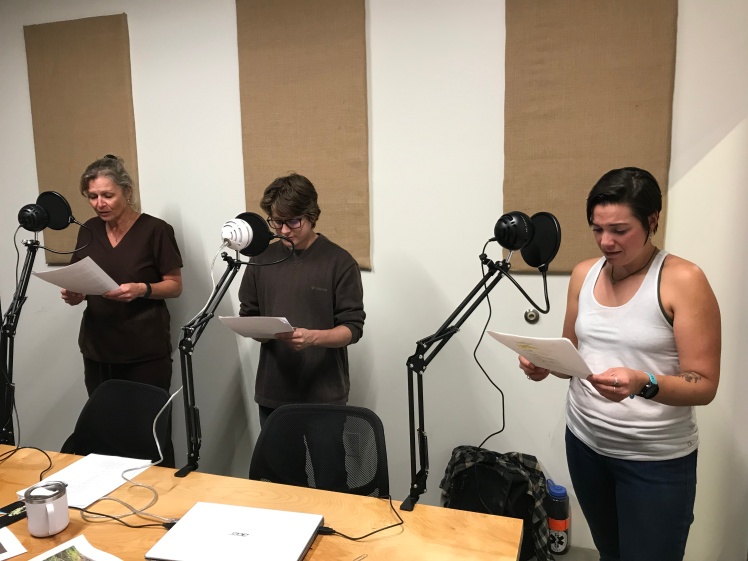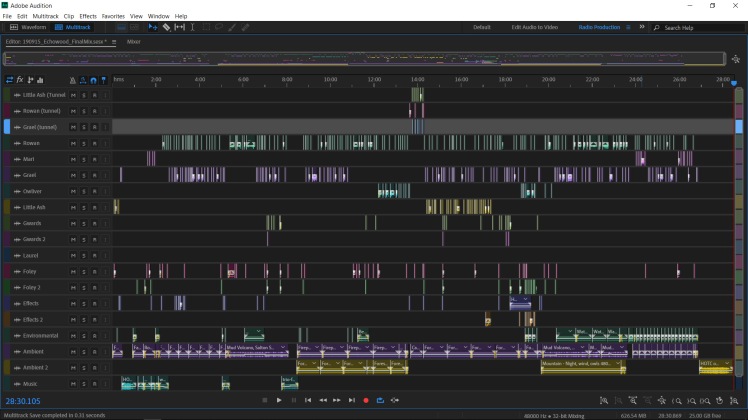SPOILER ALERT! Listen to Return to the Echowood before you read!
When I was young, I created worlds.
I think this is something every child does. As inherently creative beings, the urge to invent stories is as all-consuming and powerful as the need to eat, sleep, and socialize. I don’t know if it’s in our DNA, the soul, or the influence of storytellers who came before – all I know is that the unfettered imagination of a child puts even the most inventive fantasy authors to shame.
This is for one reason above all else: in a child’s mind, they’re not creating an imaginary place. They’re creating a cosmos more real and solid than the ill-defined and fleeting world around them.
There is history that can be known for sure. There are geography and politics that are simple and clear-cut. There are languages and dialects that everyone can speak and understand, and aside from any dark and sinister forces at the periphery of the world, harmony and unity keep twinned rule over all the land.
Dark as it may be at times, as cruel as the darkness may be, the sun always rises again. It’s a world created in the image of a child – built somewhere between the way they believe the world should operate and the way they think it does. Children know that life can be terrible, random, and awful at times, but in order to survive it, they cling to their faith that everything will end happily ever after.
Then we grow up. We realize that there is nothing “ever after” about happiness. Life lifts us up only to throw us down, then repeats the cycle with manic glee. We’re stuck in a tumble dryer, and our only hope is that the cycle will be up as often as it’s down – at least until the ride finally stops. Reality overtakes fantasy as we think less and less of our imagined worlds and more about the electricity bill going up by $20. We forget our creations and get on with the 9-5 of living.
But our creations don’t forget us.
…
I was stuck.
I’d just published Lesson 4 on Homestead on the Corner (and only by the skin of my teeth), and I had no idea what the next story was going to be. In case you didn’t know, when you want to produce a 20-30 minute full cast audio drama, you really should have the script at least started by the time you’re two weeks out from release. I didn’t even have an outline.
With “Disquiet” and “Worlds Apart,” I had the story on lock by the time the previous episode was released, and those were still extremely time-crunched in production. But here I was, twelve days from release with no story, no outline, and a definitive lack of a script. For lack of a less cliché term, I was experiencing writer’s block for the first time in months.
I scrambled. I floundered. I flipped the frick out a bit. See, the funny thing about producing an anthology series is that you don’t really have a core story to fall back on. You can’t just make an “episodic” or a clip show when you’re stuck: each new story needs fresh characters, fresh ideas, and a fresh world to explore. Lucky me.
(Let me just take a moment here to explain why I’m making Homestead the way that I am. While I first fell in love with audio drama through serialized podcasts like Wolf 359 and The Bridge, I decided to focus on standalone stories instead of a single long-form narrative. I initially did this to reflect the format of my blog and to write stories in new, unfamiliar genres, but I’ve come to realize that I was reacting to the trend away from the new, unusual, and original in a lot of mainstream media. By constantly shaking up the format and telling new original stories every month, I’m trying to show that familiar stories and characters aren’t half as important to audience satisfaction as consistent storytelling craft and passion. I may be one little podcast creator without a budget, but if I can take these risks, then those with money, power, and influence should be willing to risk one less zero on their bottom line… or at least leave indie creators enough space to grow on their own.)
Anywho, I was up the creek without a paddle. For a while I toyed with a couple of bad ideas: remaking one of my old short films as an audio drama, creating a time travel story that would link a few of my previous episodes together, and a concept that began and ended with “moon.” Eventually, out of my brain with frustration, a little nugget of an idea appeared – the idea of “Paracosm.”
A “Paracosm,” for those unfamiliar with the term (as I was until a few weeks ago), is defined by thefreedictionary.com as “a prolonged fantasy world invented by children; can have a definite geography and language and history.” Several prominent authors, from C.S. Lewis to Emily Brontë, extensively developed such fantasy kingdoms at a young age. I have vague memories of several of my own, created out of school hallways and vacation spots and the backyards of my childhood homes, fused with whatever I happened to be reading/watching at the time. A family friend’s cabin became the entrance to a Narnian wilderness. My Middle School became an evil organization I was infiltrating as a spy (no, I wasn’t a fan of public school). And that hole in the dirt behind the house definitely led to China (which in my somewhat off-kilter imagination was as fantastical a place as Cair Paravel.
In short order, that idea had its name. Originally, Echowood had been part of an incomplete short story I’d written soon after graduation, conceived of as an otherworldly plain from which all myths and stories arose. But the name fit the world created by a child’s mind far better, and even more so one that endured into adulthood – a place that echoed endlessly in the recesses of memory.
The broad strokes of the plot came with the premise of the story; “a now-grown-up child decides to flee the complexities of adulthood for the comforting simplicity of their childhood imagination.” I’d just finished reading Joseph Campbell’s The Hero with a Thousand Faces at the time, and I realized the story fit the monomyth model perfectly: it was literally the story of a character taking a journey that was both inward and outward, being changed at a fundamental level before returning to the ordinary world.

In short order, the steps of the journey fused themselves to characters, situations, and fragments of dialogue. Grael arose as a false-ally enemy, developing into an emotionally immature, overly-protective leader whose inability to accept change and growth transforms him a terrifying figure while still maintaining his naivety and charm. Owliver appeared in my mind as unexpectedly as he entered the story, serving as an ally, mentor, and representative of the wider world while also presenting a positive figure to Grael’s negative one: a character dedicated to Rowan’s continued growth and education instead of keeping her a child. Little Ash was there from the beginning, alongside Rowan. As one of the major themes of all the Homestead stories is the breakdown of communication in relationships, I wanted to explore the ways we communicate and relate to our own past. Little Ash originated in the idea of a break between a person and their memories of childhood, and all the damage that could cause to a character’s psyche.
The Gwards were just added for laughs. Hey, not every character needs philosophical underpinnings.
With story, plot, and character in place, I began the script, hammering out four rounds of edits on the script within a week… the last one on the day of the table read. As with all scripts, there were difficulties in the nitty-gritty, but overall, I was over the moon with the results. It featured pretty much all my favorite storytelling elements: mythological creatures, folk/fairy-tale elements, philosophical and psychological themes, strong characters, LGBTQ+ representation, mystery, drama, and the self-actualization of the protagonist.
The script was also 36 pages long, had seven speaking parts, and was full-bore fantasy that needed to be expressed entirely through dialogue, sound design, and music.
Holy shit, I’m in over my head.
It was an old familiar voice… one that’s spoken up at least once on every project I’ve ever been a part of. I told it to shut up, and drowned it out with work.
Mammoth is small, and its theatre community is small as well – but it’s vibrant, exciting, and full of wonderful, generous people. With both Disquiet and Echowood, everyone I approached for a role said yes almost immediately, even though a few of them were writing and directing other projects or staring in other shows at the same time. If any of the cast are reading this now, let me remove any possible ambiguity and say you’re all brilliant and I loved working with you!
Anyway, I had my biggest production to date cast in less than a day… which was good, because to make everyone’s schedules work we needed to conduct the table read the very next evening. (I’m so professional!) Gathering in the community conference room at the local Starbucks (which is also run by incredibly generous, wonderful people), Leslie (Rowan), Sam (Grael), Maurice (Owliver), and Jenna (Little Ash) performed the literally hot off the presses script for Return to the Echowood.
And holy moly was it enlightening.

Maurice didn’t hide his surprise and annoyance at Owliver’s sudden death. His raw reaction helped me realize I needed to make a few changes to give the moment appropriate weight and respect the character. At the same time, the dialogue ping-ponged between Leslie and Sam brilliantly, and Rowan and Grael’s relationship appeared right before my eyes (or ears, I guess). And Jenna, the first young actor I’ve ever worked with, was absolutely spot-on almost from the start. You know what they tell you about not working with kids? Either they’re full of it, or Jenna’s the exception to the rule.
The week passed. I tinkered with the script, making tiny tweaks here and there. My excitement grew all through an insanely busy string of days. The Friday before we recorded, we had one more rehearsal. It was just as brilliant, and we hammered out the more difficult scenes late into the evening. By the end, I was certain we had something special on our hands. More importantly, everyone was having fun. In my experience, the emotional tenor of the cast always comes through in the final product. If the cast isn’t enjoying the show, then neither will the audience.

Saturday came: the first day of recording. In a truly ingenious bit of scheduling on my part, it was also the last Trail Stewardship event at my day job. Oh boy.
The event began at 7:30 and wrapped up around 2:30. That left me a solid half-hour to ready the recording equipment and catch my breath. I accomplished one of the two; I’ll let you guess which. Even so, the cast was patient and professional, listening carefully as I tried to stuff my somewhat rattled thoughts into actual English words. Here’s a pro tip for anyone looking to create their own audio drama: rehearse. I know it doesn’t seem like you need to since you can record as many takes as your hard drive can handle, but trust me, if recording day arrives and you’re frazzled, tired, or just having a terrible day, the work you did in rehearsals will pay huge dividends and make your actors so much happier.
Recording wrapped up at approximately 7:30pm. Finding myself at the end of an unexpected 12-hour workday, I fell into bed and slept like a baby.
Sunday brought the last block of recording, as Marlene (Mari) had obligations on Saturday that kept her from joining recording session one. In a way, it worked out really well: crazy Saturday was for all the scenes involving Echowood, while the considerably more sedate Sunday was for the scenes in the “real” world. Leslie and Marlene wrapped up within an hour, and then editing began. Alex Brown – the creator and star of The Bridge – enthusiastically agreed to lend her voice to Laurel, which was just such a cool moment for me as a fan of the show. Seriously, Alex, thank you! With all the pieces in place, I chugged a cup of coffee and got to work.
And then it was Wednesday. The edit was done. I believe I was actually conscious during the whole process, but looking back on it about a week later, it’s a bit of a blur. It certainly didn’t help that the power went off in Mono County for 12 hours on Monday, cutting the internet and leaving me with half a laptop battery. But on Wednesday, two days late and two dollars short, Return to the Echowood launched.

When I finally gave myself a bit of distance and listened to it with fresh ears, I was immensely proud of how it turned out. Sure, I could’ve spent a little bit more time filling out the mix… but honestly, I like the minimalist soundscape and score for its clarity. There are a few small edits that could’ve been tighter, but the performances and the overall tone of the script carry the story perfectly. If I had a little more runtime, I would’ve liked to have fleshed out the world a tiny bit more… but as they say, brevity is the soul of wit.
There’s a common saying in filmmaking that no film is ever finished, it escapes… and that’s what happened here. I’m just so happy that it escaped in the way that it did: a little messy, but beautiful in spite of – or perhaps because of – that messiness.
…
This is the first post in a series of behind the scenes looks at the production process for the Homestead on the Corner podcast. Let me know if you want to see more stuff like this, or if there’s a technical or creative area you’d like me to discuss in more depth.
